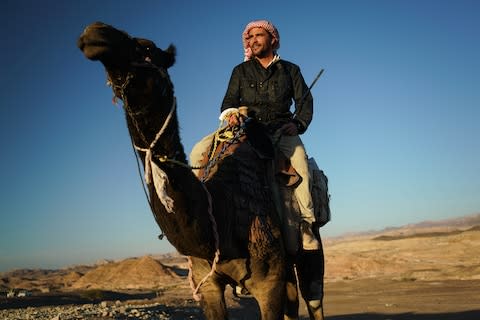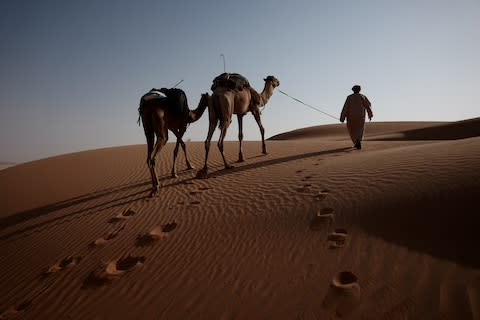Levison Wood's near-death experience in the mountains of Oman

When the three wise men came from the East bearing gifts for the baby Jesus in Bethlehem, Mary and Joseph would have been rather pleased to receive their presents. The gold would have proven handy to pay for some decent accommodation and the myrrh useful to anoint the newborn infant, but the frankincense was perhaps even more valuable. Weight for weight, it was worth more than gold and was not only widely lauded as a priestly air freshener, but also reputed to have healing properties.
Two thousand years ago, as Jesus was being welcomed into the world by these mysterious visitors, Dhofar was at the heart of the lucrative frankincense trade. For millennia the precious resin had been used as a valuable currency between the roaming Bedouin tribes. The Boswellia tree, from which it comes, evolved in the unique biosphere of the misty mountain plateau and its sheer inaccessibility accounted for its worth.
As such, Dhofar, in modern-day Oman, was the source of the greatest trade route in the Middle East. Frankincense was exported through what is now Yemen, Saudi Arabia and up towards the Holy Land. The prized cargo was carried in caravans, mainly by camel, but also on donkeys, mules or in baskets on the heads of slaves. The traders were vulnerable to looting by bandits or being heavily taxed for passing through foreign territory. Centuries of booming trade made the towns and cities along the route wealthy and powerful. Demand grew as far away as India and Europe, and ports were built on the coast of Dhofar to ship incense over the waves.
Frankincense became a revered symbol of the utmost holiness and a staple part of religious rituals in churches or temples. It was a key substance to mask the rotting odour when embalming bodies and the white smoke that appears as it burns was believed to reach heaven. Christian priests have been walking down the nave swinging their smoking thuribles ever since and to this day the Catholic Church buys frankincense by the basket. The trees themselves grow in the mountains of Yemen and Somalia, too, but the Omanis have always claimed that their sap is the finest.
Hadi al-Hikmani knew these mountains better than anyone else. He was a man my own age who worked for the Oman Ministry of Environment and Climate Affairs, preserving leopards and other endangered species, and there wasn’t a track or trail in these mountains that he didn’t know. I’d been introduced to Hadi through a friend in the Army, who ran a business in Muscat, and he came recommended as the region’s expert.
Hadi was waiting at the foot of the mountain in a dusty car park with six camels.
“Salaam alaikum, Lev,” he said. “Ready for an adventure?”
I smiled back. “Come and meet the boys,” he added.
He led me over to the camels and on the far side, four men were busy stuffing water bottles and rations into hessian sacks.
“This is Salim Suhail,” said Hadi. An old man, who looked to be in his 60s or 70s, stood to attention in a sarong and green checked shirt and shook my hand with a firm grip, afterwards touching his chest.
“And this is Ali Said, his cousin.”
A slightly younger man, who looked to be 50 or so, with a grey stubble that matched his turban and smiling through perfectly white, shiny teeth, grasped my hand and pulled me towards his face. For a second, I thought he was going to kiss me on the lips and in a slightly awkward fashion, I did the most English thing possible and puckered up in reluctant expectation.
Fortunately, he was just gracing me with the typical Omani greeting, a touching of noses.
Next to him were two much younger men, in their 20s.
“This is Said Suhail and Said Salim.”

Said number one, resplendent in a full maroon outfit, wore a pair of stylish aviator sunglasses and brandished a huge hunting rifle. The other Said said nothing and just held his hand on his heart. These were the sons of the older men.
“It’s to protect against wolves and hyenas,” said Said in Arabic, as he saw me eyeing up the rifle. As I walked away to sort out my own bags, Hadi whispered in a conspiratorial fashion, “It’s actually to protect against the smugglers.”
Of all the men, only Hadi wasn’t wearing the traditional dress of the Jebali people, that being a wraparound skirt, a bit like a sarong, with a long-sleeved checked shirt, military-style waistcoat and an ammunition belt with a long, curved dagger stuck down the front. Despite having been born in a cave in the mountains, Hadi was a modern man. He had been to the city and even studied in England for a while.
When everything was loaded up, we set off from the road towards the looming cliffs. From here they looked almost impenetrable. “There are only two ways up,” said Hadi, “and both of them are off-limits. But I have special permission.”
The escarpments rose sharply; a steep climb lay ahead and even though I could not see a path, Hadi assured me there was one that wound up through the valleys and into the rocky cliffs ahead. I had no idea how on earth the camels would manage it.

Hadi laughed when I told him. “Ha! You haven’t seen our camels. They’re proper camels, the ships of the mountains, never mind the desert, not like town camels. These can carry 150 kilograms [330lb] and will still fly up these cliffs. Don’t worry about that.”
I watched with amazement. Hadi was right. These animals barely needed any encouragement. Their padded feet seemed to glide right over the jagged rocks, and they weaved between the enormous boulders with ease.
The narrow footpath led to the base of the cliff, where under the shade of an acacia tree, a group of soldiers marked the entrance to the jebel. They wore a mixture of orange and black camouflage uniforms.
“They’re the Oman army,” said Hadi, as we neared the machine-gun position, flanked by sandbags. The soldiers in orange turbans, with futuristic-looking rifles, seemed surprised to see us. “Wait here,” said Hadi, as he went ahead to greet the soldiers. I noticed two more military men get up and shake hands with my new guide. They looked different, though; these two wore flip-flops and green headscarves. Hadi waved me and the camel men over and we approached with caution.
“These are the Firqat,” said Hadi, introducing me to the two irregular fighters. “They’re the local tribal militia. They’ve guarded these hills since the war.”
“Why are they here?” I asked, wondering why they were needed.
“To protect against smugglers,” said Hadi. “Somalis come by boat and sneak into the jebel to harvest the frankincense illegally, and they usually come armed. And as you know, Yemen isn’t far away. The sultan has been careful to make sure these passes are guarded against insurgents after what happened last time.”
You mean the rebellion?” I said, recalling my military history. I remembered from my Army days, studying all about the Dhofar insurrection in the Seventies, where the SAS were involved in flushing out the terrorists from these very mountains.
Hadi smiled. “You could call it that, I suppose. We prefer to say uprising. Anyway, that was a long time ago, before you and I were born.” He slapped me on the back and waved to the soldiers as we passed under the barrier and followed the trail that led up into the craggy valley. “Let’s go.”
The sun was beating down and by mid-morning the temperature was almost 104F (40C). The path became narrower and narrower as it climbed, until it was nothing more than a thin footpath that zigzagged between the bronze-coloured boulders. The camels lumbered on unperturbed and I watched in astonishment as they climbed. I was sweating like a pig following in Said’s footsteps. He was wearing a full-face balaclava and not an inch of his skin was showing. “To stop the sun,” he said, pointing at the blazing orb above that had burned the mountains to a crisp.
He was a decade my junior and the heat didn’t seem to bother him as much as the prospect of getting a suntan. He skipped along with his rifle across his shoulders like a crucifix. I kept my eyes fixed firmly on his feet ahead, making sure to watch my step. One false move and a slip would mean disaster. The cliff fell away to the right with a 300ft drop and it was only 2ft wide.
Suddenly there was a loud rumble up above. Hadi shouted, “Watch out!” I looked in dread; one of the lead camels must have stumbled on the loose shale and sent a boulder crashing down the cliff side. I saw it bounce with horrifying violence across the footpath in front of us and down into the crevasse below. That was close, I thought to myself.
“You OK?” shouted Hadi, as he and Salim came running over.
“Fine,” I said, relieved not to have been crushed by the rock but, in reality, acutely conscious of the new dangers the mountains presented. I noticed for the first time that Salim, the old man, was carrying a full-length broadsword in a silver scabbard.
“What on earth is that for?” I asked. “Don’t tell me Salim is going battling smugglers with a bloody sword? Or even leopards for that matter.” Hadi chuckled. “No, of course not. It’s for killing injured camels.”
“Do the camels ever fall?” I asked, now slightly concerned I’d end up with a beast weighing a ton falling on my head. “I thought you said they can fly up the cliffs.”
Hadi laughed. “I told you, they’re the ships of the mountains. They rarely fall.”
“Rarely?”
“Well, it does happen but not very often. If it does, the camel driver gets blamed and they never live it down. Camels are expensive, you know.”
I knew that much all right.
“There was this one guy 30 years ago that my father told me about, when I was five years old. He was leading the camels along this very same ridge, and his camel slipped down a cliff and was killed. It took the men three days to carve it up and carry the meat down to the village. None of it went to waste, but the camel driver was so ashamed he left the village forever. People still talk about him to this day.”
Essentials
Audley Travel offers an eight-day Discover Salalah Tour from £3,920 per person, based on two sharing. The price includes flights, transfers, luxury hotel accommodation in Salalah, excursions, some meals and a hire car for part of the trip.
A series of talks, Levison Wood Journeys Through the Badlands and Beyond, begins tonight in Sheffield and continues in various UK cities until Nov 18. Tickets cost from £27.50.
This article is an edited extract from Levison Wood’s new book, Arabia: A Journey Through The Heart of the Middle East, which will be published by Hodder & Stoughton on Nov 1 at £25. To order your copy for £20 incl p&p visit books.telegraph.co.uk.

